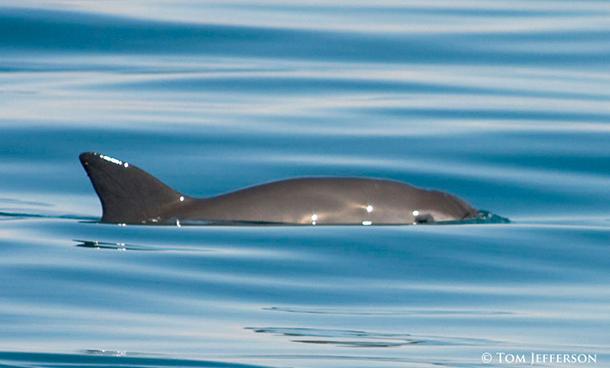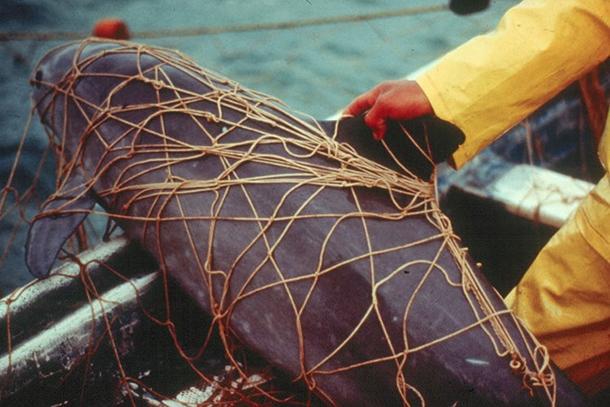The rarest porpoise in the world is on the verge of disappearing forever
A deceased vaquita, killed by gillnet gear used for catching totoaba, is pictured here.
The vaquita, the world’s smallest porpoise, lives only in Mexico’s Gulf of California and is critically endangered, due to illegal fishing. Now, the Center for Biological Diversity plans legal action against the US government for its failure to sanction Mexico for not stopping the poaching of vaquitas.
The vaquita was first identified by scientists in the 1950s, so it is a relatively “new” species, says Sarah Uhlemann, the International Program Director for the Center for Biological Diversity. Scientists believe that even since its first identification, their numbers have been declining.
“Vaquita are the rarest porpoise in the world,” Uhlemann says. “They are only about five feet long. They're evasive. They're very shy. They swim away from boats. They consume a lot of fish. They are an integral part of a very amazing ecosystem. Jacques Cousteau called this habitat, the Gulf of California, 'the aquarium of the world,' and this is one of the key species in the aquarium.”

Vaquita face really one threat — entanglement in a particular kind of fishing equipment called gillnet gear. Gillnet gear is essentially two buoys on the ocean surface, with a line that runs between them and a net that hangs down below.
“Gillnets are very effective at capturing whatever fish a fisherman is targeting. But, they are, unfortunately, also very effective at capturing pretty much anything that swims by including, unfortunately, the vaquita,” Uhlemann explains. “Vaquita get wrapped up in the net and they, of course, need to breathe. But they aren't able to get up to the surface, so they drown. It's a pretty rough way to go.”
For about 30 years, vaquita were getting caught in gillnet gear targeting shrimp. Their population declined until about 2008 when scientists estimated there were only about 250 left. Then, in 2011, a huge surge in fishing for totoaba threatened to deal vaquita their final blow.
“Totoaba is an enormous fish. It's five feet long, so actually just about the same size as a vaquita,” Uhlemann says. “It is in demand in China for its swim bladder, which is an organ that essentially helps the fish stay afloat. Some people in China believe that the bladder, when it's dried and reconstituted into a soup, can improve fertility and improve skin tone. Of course, there's no scientific evidence to support that, but nonetheless, totoaba bladders are in enormous demand. Totoaba bladders regularly sell for about $14,000, and some of the really, really, big bladders can sell for up to $50,000 apiece. These are insanely lucrative fish.”
Totoaba are also endangered. Fishing for them is illegal in Mexico and trade of them internationally is banned. But, because of the enormous price they can fetch, totoaba fishing still goes on — and, unfortunately, to catch totoaba, fishermen use gillnets, which entangle vaquita.
While the fate of the vaquita ultimately rests with the Mexican government, the US has an important part to play, Uhlemann says. A US law called the Pelly Amendment states that if the US government finds any nation in violation of a wildlife treaty, it can “certify” that nation — that is, formally notify the nation that it is violating the treaty. The president can then sanction the nation, usually through embargoes or a ban on imports of some kind of wildlife product.
In 2014, the Center for Biological Diversity filed a petition requesting that the US government certify Mexico for violating the CITES treaty. CITES is the Convention on International Trade in Endangered Species, which governs trade in imperiled species. Both totoaba and vaquita are protected under CITES. By failing to enforce the ban on trade in totoaba, Mexico is violating the CITES treaty, the center argued.
The Obama administration understood the problem and pushed Mexico to act and “we understand that the agencies will soon be responding to the petition, but we need it to happen soon,” Uhlemann says. “The reality is that there are only 30 vaquita left on Earth, and if we don't act now — right now — we will lose the species forever.”
“Scientists thought there were about 60 vaquita [left] in 2015 and there was a decline of about 50 percent in 2016 alone,” Uhlemann says. “That is just a shocking level of decline. If declines continue, this species will be functionally extinct in two years.”
This article is based on an interview that aired on PRI’s Living on Earth with Steve Curwood.
